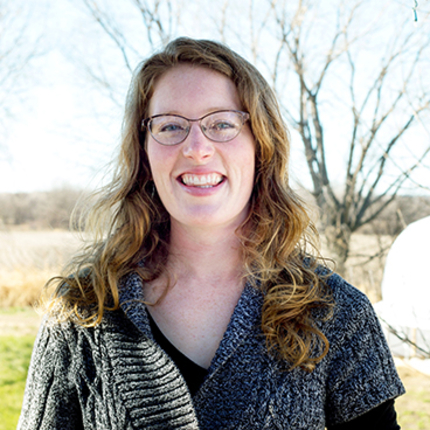This is the first of two case studies we completed on our Women's Learning Circles. Check out the one page case study here.
Erin Schoenberg, and business partner, Margaret Milligan, used their knowledge of growing produce, vegetables, and herbs to launch their business, The Darlin’ Reds.
Located northwest of Lincoln, Nebraska, the small, diverse vegetable farm provides healthy, fresh, and clean produce to a Community Supported Agriculture (CSA), local restaurants, and grocery stores.
The women started the venture while working full-time off the farm, and found land to rent through existing contacts. Their landlords wanted to help beginning farmers and entrepreneurs, which was a perfect fit.
“We wanted to grow in the same way we wanted to consume,” Schoenberg said. “Our goal was to use our personal experience growing vegetables to help us farm specialty crops.”
The duo spent extra time and care to make sure only sustainable farming practices were used. Conservation was a priority.
“In a world of mass-produced, globally-sourced materials, we strived to show our community just how good local food can be,” Schoenberg said. “Growing good food is a passion and addiction for us.”
Farming methods included careful planning, crop rotation, and cover crops. Soil amendments, such as using manure to improve soil quality and overall plant health, were also utilized. The farmers do not use synthetic fertilizers, chemicals, or genetically engineered seeds.
When The Darlin’ Reds began, Schoenberg’s full-time job was with the Center for Rural Affairs, which gave her much-needed support. She and Milligan also received a microloan from the Farm Service Agency, which helped pay for a hoop house, tractor, and tiller. The owners networked with other women at the Nebraska Sustainable Agriculture Society’s young farmer nights.
For four years, The Darlin’ Reds sold produce wholesale to restaurants and farmers markets, and hired an employee for two seasons. Volunteers were paid in produce.
In late 2016, the two women decided to discontinue the business. Though Schoenberg says she and Milligan were great business partners, and the business was financially successful, they were not ready to commit to farming for the next 20 years of their non-professional lives.
“We couldn’t find balance,” she said. “We were definitely overdoing it. It was hard to maintain sanity and be productive, and hard to stay focused on our other jobs.”
The business owners share their experiences with others – what worked and what didn’t work. Schoenberg took part in the Center’s Women’s Learning Circles; peer group sessions that consider participants as the experts on their own production, farmland, and conservation needs. Information, experience, and resources are shared at each circle, allowing women to implement what they’ve learned into their own farm business or operation.
Eventually, Schoenberg became a Farmer Leader at the learning circles, where she educated other women about agriculture by sharing her own experiences.
“It's boundlessly good for the brain to be exposed to something outside the norm and for us to have conversations with people whose challenges may mirror or completely differ from our own,” she said. “Bonus points for getting to catch up with my neighbors.”
Though The Darlin’ Reds venture didn’t last, Schoenberg remains active in local agriculture, and as a leader in the Center’s Women’s Learning Circles.
“We couldn’t make a living [on a vegetable farm] by year three, like we had hoped,” Schoenberg said. “Be realistic and focus on your business. It’s really important people understand farming is all-consuming. Have a good understanding of what it will take; know you are committed and dedicated; be serious about it, or don’t bother.”





